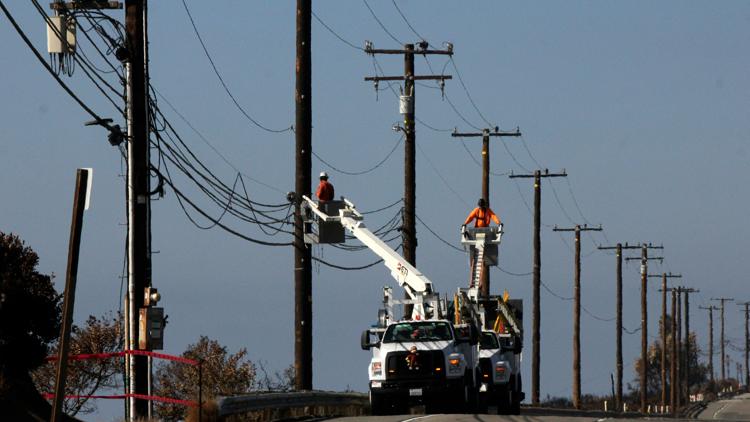SACRAMENTO, Calif. — California regulators on Thursday voted to change how some power companies calculate their customers' bills, a decision that will make it less expensive for people to charge electric cars and cool their homes in the summer but will increase prices for those who don't use as much energy.
The California Public Utilities Commission voted to let the state's big investor-owned utilities — including Pacific Gas & Electric — add a fixed charge to people's power bills each month. For most people, the charge will be $24.15 per month and it will pay for installing and maintaining the equipment necessary to transmit electricity to homes. Residents with lower incomes who are enrolled in one of two discount programs will pay less, either $6 or $12 per month.
In exchange for the new charge, the price of electricity will drop by between 5 cents and 7 cents per kilowatt hour. One kilowatt hour is how much power it takes to use a 1,000-watt appliance — a coffee maker or vacuum cleaner, for instance — for one hour.
The change will take effect late next year for customers of Southern California Edison and San Diego Gas & Electric. It will take effect in early 2026 for Pacific Gas & Electric customers.
For people who use a lot of energy each month, this will lower their monthly bills. People who live in Fresno — where temperatures can often exceed 100 degrees Fahrenheit (37.8 degrees Celsius) — would save about $33 running their air conditioners during the summer, according to the commission. That's because the savings they get from the price drop on electricity will be more than the amount they pay for the new fixed charge.
It will also benefit people who own electric cars and use other electric appliances, such as heat pumps. They will save an average of between $28 and $44 per month, according to the commission. In 2022, California accounted for 37% of the nation's light-duty electric vehicles, or about six times more than Florida, the state in second place, according to the U.S. Energy Information Administration.
“It provides affordability for lower-income Californians and those living in other parts of the state most impacted by extreme weather,” California Public Utilities Commission President Alice Busching Reynolds said.
For people who don't use as much energy, the new fixed charge could increase their bill each month. This includes people who live in smaller apartments or who live in cooler areas and don't use air conditioning as much. That's because for them, the decrease in the price of electricity would not be enough to offset the amount of the new monthly charge.
Opponents argue it would act as a disincentive to conserve energy, something California has been urging people to do.
“If you wanted to design a policy instrument that would send the signal that conservation doesn’t count, this would be it,” said Ken Cook, president of the Environmental Working Group.
Most states already have fixed monthly charges on utility bills to pay for maintenance and infrastructure of the electric grid. But in California — where electric rates are among the highest in the nation — any move that could increase prices for anyone raises alarms among consumers and elected officials.
A group of 18 members of Congress from California have called on the commission to keep the rate low, noting the national average for fixed charges on utility bills is $11. Some Democrats and Republicans in the state Legislature have backed a bill that would cap the charge at $10 per month.
“We must do more to rein in the ever-growing cost of living in our state, not find new ways to add to it,” Republicans in the California Senate wrote in a letter urging the commission to reject the proposal.
The proposal is much lower than what the state's investor-owned utility companies had asked for, which was a charge between $53 and $71 per month. The commission also argues the charge would not discourage conservation, noting utilities are already allowed to increase rates during peak hours.
WATCH MORE ON ABC10: Extremely high PG&E bills connected to 3 million aging meters



















